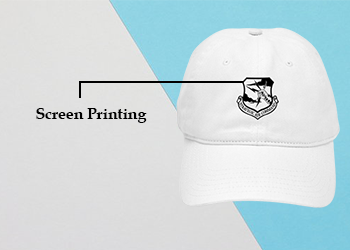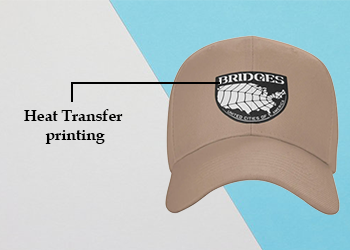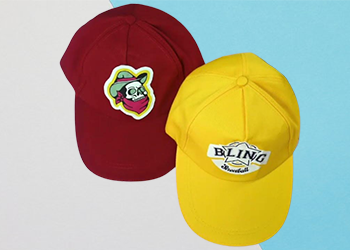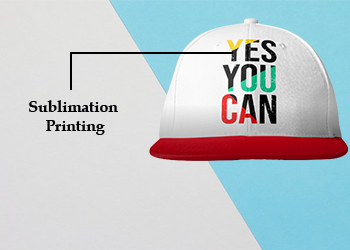
Do you want to make a memorable impact by designing your own Cap? In Dubai, we specialize in Cap
printing. The secret to printing quality is choosing the correct materials and printing methods. Every
factor, from the fabric's durability to the clarity of the colors, is important in developing a
high-quality cap with printing. Cotton is a popular fabric choice due to its softness and absorbency.
Furthermore, choosing the right printing technique is critical to bringing your design to life.
Depending on your design needs and budget, options such as screen printing, heat transfer, and DTF
printing each have specific advantages.
Cotton is widely used for caps due to its softness. It is a natural material that is easy to wear while offering excellent air circulation and durability, making it ideal for everyday use. Cotton caps are also incredibly absorbent, making them ideal for staying cool on hot summer days.

Screen printing is one of the oldest and most extensively used cap printing processes. It
includes creating a screen, and then applying layers of ink to the fabric with it. Screen
printing provides exceptional color vibrancy, durability, and versatility, making it ideal
for designs that include solid colors or bold graphics. Because of its low cost, it is
especially popular for large-scale manufacturing runs.
Screen printing is one of the most popular and versatile techniques for t-shirt design. It
involves creating a stencil, or screen, and using it to apply ink onto the fabric. This
technique allows for vibrant colors and precise details, making it ideal for large, bold
designs.
A design is put onto a fine mesh screen to begin the screen printing process, with each color
requiring a different screen. Using a squeegee, the ink is then pushed through the screen,
transferring the design to the cap. This process ensures that your design will last the test of time
by providing exceptional color saturation and durability.
The adaptability of screen printing is one of its benefits. It is effective on a wide range of
fabrics, including cotton and, polyester. Furthermore, screen printing provides a diverse range of
ink options, including metallic and unique effects, allowing for virtually limitless creative
possibilities.
However, it is crucial to remember that screen printing is better suited for larger production runs
because the process can be time-consuming and low-cost for large volumes. Intricate patterns with
precise details may also not translate properly using this technique. Overall, screen printing is a
fantastic choice for bold, one- or two-color graphics that must be durable and long-lasting.
Heat transfer requires cutting designs from vinyl sheets and complying them to fabric with
heat and pressure. This technique is ideal for alterations and personalized caps since it
enables for precise and elaborate graphics. Heat transfer provides outstanding color opacity
and durability, but it is critical to follow proper maintenance guidelines to avoid the
vinyl peeling or cracking over time.
Heat transfer vinyl is a popular way to personalize
caps, especially for single-color or simple graphics. This approach includes cutting a
design out of vinyl material and then transferring it to cloth with heat and pressure. Heat
transfer is often used to create names, numbers, and logos on caps because it allows for
exact, crisp drawings.
A cutting machine is used to cut the appropriate shape out of the vinyl material to create a design
via heat transfer. After that, the extra vinyl is removed, leaving only the desired design on a
carrier sheet. The design is applied to the fabric, then heat is applied with a heat press or a
household iron to cause the vinyl to cling to the fabric.
One of the benefits of heat
transmission is its long life. Because vinyl is resistant to fading, breaking, and peeling, your
design will last for a long time. Heat transfer can also be used on a variety of materials,
including cotton and polyester.
However, it is vital to note that heat transfer is confined to
single-color or simple designs on caps. It might not be the ideal option for complicated,
multi-color artwork. Furthermore, when compared to other printing procedures, heat transfer can seem
slightly thicker on the fabric. Overall, heat transfer vinyl is a good choice for creating simple,
long-lasting patterns on caps.


DTF printing is a new method that uses specialized inkjet printers to apply ink directly to
the fabric caps. This technology enables the creation of elaborate designs with a high level
of detail and color fidelity. DTF printing is perfect for small batch production or one-off
designs because it does not involve the fabrication of screens or stencils. However, it is
vital to remember that DTF printing is more cost-effective for large-scale manufacturing
runs.
DTF printing is a newer method that has grown in favor in recent years. This approach
involves the use of a specialist printer to apply ink directly into the cloth, resulting in
a soft, bright design. DTF printing is especially well-suited for complicated designs with a
high level of detail and various colors.
To achieve optimal ink absorption, the fabric is first pre-treated. The garment is then inserted
onto the printer, and the design is printed directly onto the cloth. DTF printing enables accurate
color matching and the ability to faithfully copy intricate artwork
One of the primary benefits
of DTF printing is its capacity to make high-quality prints in an infinite number of colors. This
procedure also works well on a variety of textiles, including cotton and polyester. Furthermore,
because there are no set-up fees or minimum order quantities, DTF printing is a perfect alternative
for short production runs.
However, it is crucial to note that DTF printing may not be as
durable as other processes, particularly when applied to darker textiles. Instead of being absorbed
by the fabric, the ink sits on top of it. Nonetheless, DTF printing is a good solution for
elaborate, vivid patterns and smaller numbers.
Sublimation printing includes the use of heat to transfer dye onto cap, resulting in
brilliant and long-lasting graphics. Because the dye molecules link with the cap fibers,
this process works best on cloth materials. Sublimation printing provides an infinite number
of color options and allows for full-color, all-over designs. It is crucial to note,
however, that sublimation printing is not appropriate for cotton cap or natural cap fiber
fabrics.
Sublimation printing is a process that uses heat to transfer dyes onto cloth materials.
This technique allows for full-color, photo-quality patterns with exceptional durability and
color vibrancy. Sublimation printing is often used for caps, sports jerseys, sportswear, and
other items produced from cloth materials.
The sublimation printing process begins with the design being printed onto special sublimation paper
with dye-based inks. The paper is then placed on the fabric and heated, causing the ink to convert
into a gas and permeate the fabric. As the fabric cools, the ink hardens, resulting in a
long-lasting, bright design.
One of the benefits of sublimation printing is the ability to create
brilliant, long-lasting designs that will not fade or crack over time. Because it allows for exact
color reproduction and superb detail, the technology is also appropriate for intricate, full-color
artwork.
However, it is vital to note that sublimation printing only works on certain fabrics,
such as polyester and cotton. Furthermore, sublimation printing is a more specialized technique that
necessitates the use of specialist equipment and materials. Nonetheless, if you're searching for
high-quality, full-color designs on fabrics, sublimation printing is a great option.

1. Choose designs that are clean and basic that will stand the test of time. Overcrowding the
design with too many features or elaborate details should be avoided.
2. Choose colors that complement one another to ensure your design shines out. When choosing
your design colors, keep the color of the fabric in mind.
3. ensure your design files
are in the appropriate format. Vector files, such as .ai or .eps, are ideal for ensuring
high-quality prints.
4. Properly caring for your printed cap is essential to maintaining
their appearance and longevity. Always follow the care instructions provided by us to ensure
your designs last.

Behind Shafeer Market,
Industrial Area 17,
Sharjah - UAE.